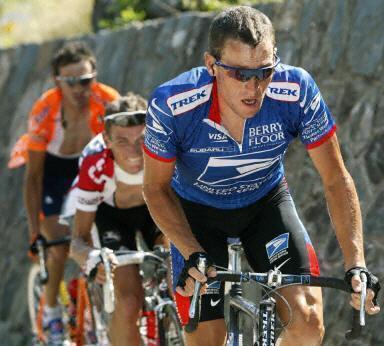Armstrong attorneys demand apology from CBS
Updated: CBS exec stands by report

Lance Armstrong's legal representatives have written to the US television network CBS asking for an apology for its "60 Minutes" report in which Tyler Hamilton alleges he witnessed Armstrong using EPO and told of a cover-up of a positive anti-doping control.
San Francisco attorneys Elliot R. Peters and John W. Keker, newly added to Armstrong's legal team, wrote a letter to CBS News chairman Jeffrey Fager demanding an on-air apology to Armstrong for the "demonstrable falsehoods that [host Scott Pelley] recklessly presented, and then bolstered with other untrue assertions and facts taken out of context".
Fager responded, saying that "60 Minutes", "stands by its story as truthful, accurate and fair".
The letter from Armstrong's lawyers, sent to Cyclingnews, makes no mention of Hamilton witnessing Armstrong using drugs, but refutes several points made on the show and states that "further factual proof has come to light, demonstrating beyond doubt that the factual assertions at the heart of the 60 Minutes broadcast were false."
In part two of the "60 Minutes" report, Tyler Hamilton states that he was told by Armstrong that, during the Tour de Suisse, Armstrong tested positive for the banned blood boosting hormone EPO, and that the test was covered up.
"I don't know all the exact details. But I know that Lance's people and the people from the other side from -- I believe from the governing body of the sport figured out -- figured out a way for it to go away," Hamilton said, indicating that the UCI and Armstrong's team had conspired to cover up a positive test.
Peters refutes this part of the show, stating that there was no positive test from the 2001 Tour de Suisse. Cyclingnews obtained a list of all EPO positives from 2001-2003 detected by the Lausanne laboratory which confirms this.
The latest race content, interviews, features, reviews and expert buying guides, direct to your inbox!
However, a later report from the Swiss newspaper Neue Züricher Zeitung confirmed there were four suspicious EPO test results detected in the race. But Martial Saugy, the Lausanne lab director, said that he would have been unable to connect any of the suspicious tests found in the 2001 Tour de Suisse to Lance Armstrong.
"They were taken at four different stages, so I don't know whether they were from four different riders or all of the same athlete," Saugy said to NZZ. "But the tests were not covered up, and it is also not correct that they could have been interpreted as positive. They were suspect, and you wouldn't stand a chance at all with that sole argument in front of a court."
The difference between a positive and suspicious EPO test is one of degrees. Since the EPO hormone occurs naturally in the human body, it is only distinguished from the man-made version by the distribution of the sizes of the hormone and its byproducts in the rider's urine. The labs set a threshold for a positive test, but called tests falling just below that threshold as suspicious -- and while those results could not be used to trigger a disciplinary hearing, they were reported to the UCI.
The 60 Minutes report cites an "official familiar" with the federal investigation into doping within the US Postal team who states that the Swiss lab director gave a sworn statement to the FBI saying the UCI wanted the suspicious test to "go no further", insinuating that the results were covered up. However, keeping the results private would not be unusual since the tests did not meet the standard of a positive, and could not be used to sanction a rider for doping.
"The tests were not swept under the table and it's not true that they could have been interpreted as positive," Saugy said.
Saugy confirmed, however, having met with Armstrong and team director Johan Bruyneel to explain how the EPO test works, and why there are suspect samples as well as positive ones, but he denied that the meeting was to discuss any particular result or cover anything up.
Peters said the discussion on 60 Minutes of the meeting "simply created an innuendo of improper conduct from pure fiction".
"In the cold light of morning your story was either extraordinarily shoddy, to the point of being reckless and unprofessional, or a vicious hit-and-run job," Peters wrote. "In either case, a categorical on-air apology is required."
Fager, the executive producer of the show, responded, saying "Lance Armstrong and his lawyers were given numerous opportunities to respond to every detail of our reporting for weeks prior to the broadcast and their written responses were fairly and accurately included in the story. Mr. Armstrong still has not addressed charges by teammates Tyler Hamilton and George Hincapie that he used performance enhancing drugs with them".
